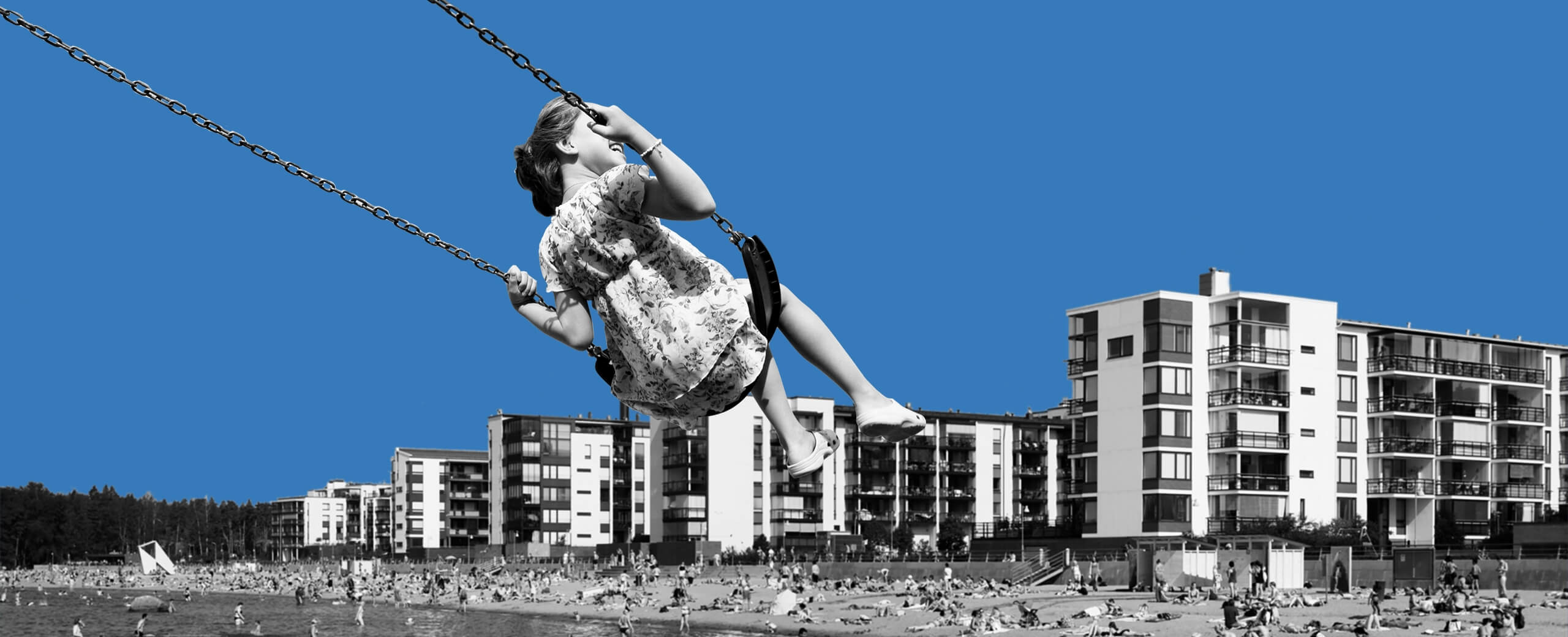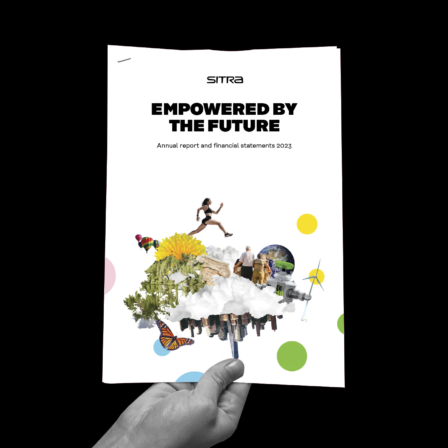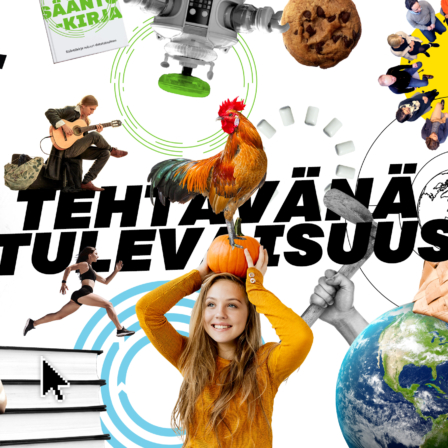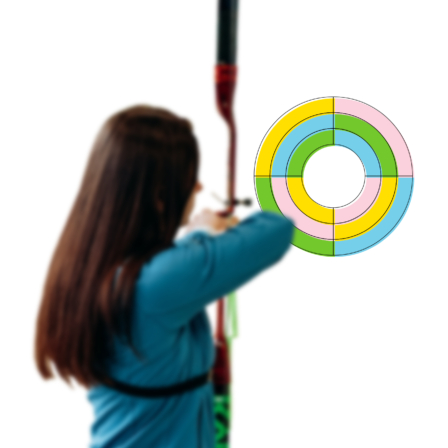Authors: Olli Oosi, Mikko Wennberg, Juho Saari, Salla Rausmaa and Jeremias Kortelainen – Owal Group Oy
The aim of our assessment was to provide information on Sitra’s impact regarding the impact objective “Addressing well-being in a holistic way”. The assessment is mainly based on qualitative data and it reviews Sitra’s activities (programmes, focus areas and individual projects) from 2011 to 2016. Moreover, the assessment describes the development of the impact objective in Finland. The assessment is based on slightly over 70 interviews, covering the key stakeholders.
The assessment has its roots in the impact objective “Addressing well-being in a holistic way” described in Sitra’s vision for sustainable well-being. The objective’s content is analysed through the following points.
- Making well-being a political priority: Expanding the understanding of well-being to include issues relating to subjective and mental well-being in addition to material scarcity as part of well-being policy.
- Simplicity to the complexities of life: Supporting solutions that offer individuals the means to make their everyday lives easier and improve their life-management skills.
- Personalized solutions and individual responsibility.
This is a short summary of that report that was originally written in Finnish.
Success of Sitra’s choices
Sitra’s objectives for achieving a well-being mindset have been ambitious. Sitra has acted as a trailblazer in changing the way of thinking about well-being. The majority of the measures taken are related to providing other parties with the opportunities for action specified in the vision – the desired impact has been achieved by doing just that.
As a whole, Sitra’s choices have been successful, and are deemed topical and important among the key stakeholders. This also applies when the choices made have not fully met the expectations set for them or have been ahead of their time, such as including the holistic well-being approach in the well-being policy.
The way of thinking based on a holistic approach to well-being and the paradigms of policy measures have not changed significantly in Finland. To some extent, Sitra has succeeded in stimulating discussion on subjective well-being and increasing understanding of the underlying drivers of well-being. Based on the assessment, this remains a topical issue.
Sitra has used, for example, practical trials concerning the freedom of choice to introduce new ways of emphasising individuals’ responsibility for their own well-being. More of the same is needed in the future.
Development of the impact objective
Some progress has been made with regard to the contents/topics of Sitra’s impact objective “Addressing well-being in a holistic way”.
In Finnish and international well-being policies and public discourse, holistic well-being has been very much linked to the measurement of subjective well-being. Internationally, strong progress has been made in the development of ways of measuring subjective and mental well-being. In Finland, however, similar efforts have had modest outcomes.
Based on the assessment’s background analysis, the socio-political debate on reforming the welfare state has focused strongly on financial aspects. Overall, it can be stated that happiness and subjective well-being have been approached from very different angles. The first time the concept of happiness was introduced to the political agenda was in the 2000s.
Research on happiness, subjective well-being and life satisfaction has increased significantly in the last 20 years.
Research on happiness, subjective well-being and life satisfaction has increased significantly in the last 20 years. Sitra has played a role in introducing new topics for such research.
The wider understanding achieved has not found its way to Finnish well-being policy though. Overall, the need to initiate discussion on what policy measures would be feasible, or what other actions could be used simultaneously to promote subjective well-being and economic growth in an ecologically sustainable manner in times of material scarcity.
Various services for supporting life-management skills have made the most progress in Finland through legislation and development of the service system. The interviewed experts view the social welfare and healthcare service system, as well as education services and youth services, as the key public service systems for fostering the ability to manage the complexities of life. Sitra has contributed particularly to social welfare and healthcare services by spurring the public sector in the 2010s.
The ability of individuals to control their own lives has been particularly emphasised in the development of public services and related legislation. Life control has been integrated into the processes of reforming social welfare legislation and the Youth Act. The concept of life control is present in many laws adopted in the 2010s.
Sitra promotes opportunities for holistic well being.
Development work has also been active with regards to working-life development and user-friendly technologies. Several of Sitra’s activities under review have also facilitated this development, such as various projects carried out under the “Transformation of work” focus area, or the way it has enabled the national service architecture work.
The promotion of individualised services in Finland in the 2010s has focused on the development of well-being services for special groups and strengthening customer orientation. Sitra has introduced several related initiatives that have contributed to achieving the goal. This assessment found very little evidence of emphasising the responsibility of the individual in public or political debate.
Sitra’s contribution and mechanisms
Sitra promotes opportunities for holistic well-being. The key impact-generating mechanisms are as follows.
Acceleration of change. In most activities, Sitra’s main role in the eyes of the stakeholders is acting as an accelerator during the initial phase of change and development work. Even though in some situations the same matters could have ended up on the development agenda, the pace of change would most likely have been much slower without Sitra. (Examples: the basic-income trial, Towards an information society, People first, Solutions for e-well-being – especially the National Genome Strategy – and the ODA project).
Activation of the public sector. Sitra’s actions in the area of the impact objective have been strongly linked to the areas of operation of the Ministry of Social Affairs and Health and local authorities. Within these areas, those involved in development work demonstrate that participation alone can strengthen and increase one’s contribution to development. The other side of this is that, in several focus areas, the groups of actors selected for the development work (e.g. local authorities) are “Sitra’s old acquaintances” or trailblazers.
Sitra is a credible partner for development work through the addition of its resources, co-operation network and reputation. Any development attempted by local authorities/businesses/central government single-handedly would not have produced the same outcome as achieved with the help of Sitra.
Influence on political decision-making. Sitra’s ability to put issues on the agenda of political decision-making was viewed as highly significant in several interviews. According to the interviewees, issues that Sitra considers topical are soon seen on the political agenda by operators in the field.
Strategic partnership and co-operation are considered Sitra’s most effective mechanisms. The greatest impact is generated when there is no obvious attempt to maximise Sitra’s visibility in the co-operation. According to the stakeholders, in many contexts, the outcome has been the result of a genuine partnership and co-operation. A change has taken place over the years and Sitra no longer attempts to “be visible as Sitra,” or to emphasise its own position in strategic stakeholder co-operation. Instead, the main focus is on the desired outcome. “Positive” pressure has also been perceived as a good thing.
Bringing experienced actors together (colliding) and assembling small actors have been among Sitra’s key operating models that have been successful in several fields. Colliding small actors work best right at the start of the work, or in situations in which there is a concrete agenda for collaboration.
Bringing ideas from the outside in is incorporated into Sitra’s activities in almost all the focus areas under review. The stakeholders mention this as one of the key ways of creating an impact, whether it is about “study trips” or introducing and piloting a ready-made model. This is nevertheless only a single mechanism, which, according to the stakeholders, works best when linked directly to an applicable activity.
The contribution associated with accelerating change emerges particularly from Sitra’s flexible operating methods, strong stakeholder co-operation process, risk-taking ability and the possibility of looking for international references and introducing insights “from the outside in”. Sitra is one of the few “non-private” societal developers, and is capable of reacting swiftly without heavy project management and bureaucracy.
Most opportunities for change are primarily linked to clarifying the complexity of life or developing individualised services. Examples of introducing holistic well-being to political decision-making, or emphasising individual responsibility, can be found among the projects. Judging from the observations of the assessment, however, the measures have not been very effective.
Sitra’s impact is greatest in cases where it has acted in a strong strategic partnership and brought together the key actors associated with a societal challenge around development. Strategic co-operation is an essential mechanism. The main purpose may not even be to operate as Sitra, but instead as a uniform network of partners through which the work is done. Sitra has also stimulated debate in the area of the impact objective under review.
This article is a summary of Sitra’s impact evaluation report written by Owal Group Oy: Vaikuttavuusarviointi 1: Hyvinvoinnin vauhdittaja.

















Recommended
Have some more.